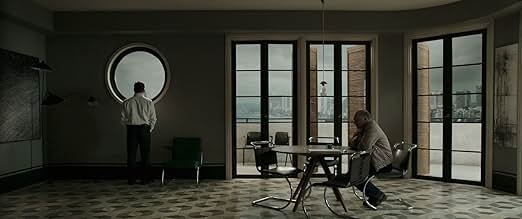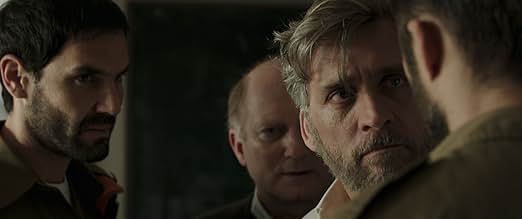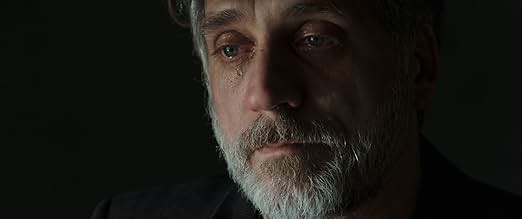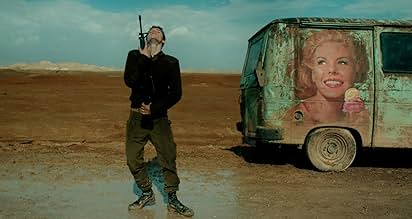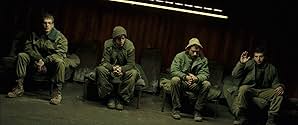IMDb-BEWERTUNG
7,2/10
8306
IHRE BEWERTUNG
Eine unruhige Familie muss sich den Tatsachen stellen, wenn etwas an dem trostlosen Militärposten ihres Sohnes schrecklich schief geht.Eine unruhige Familie muss sich den Tatsachen stellen, wenn etwas an dem trostlosen Militärposten ihres Sohnes schrecklich schief geht.Eine unruhige Familie muss sich den Tatsachen stellen, wenn etwas an dem trostlosen Militärposten ihres Sohnes schrecklich schief geht.
- Auszeichnungen
- 21 Gewinne & 25 Nominierungen insgesamt
Yonatan Shiray
- Jonathan
- (as Yonathan Shiray)
Itay Exlroad
- Dancer Soldier
- (as Etay Axelroad)
Arie Tcherner
- High Ranking Officer
- (as Aryeh Cherner)
Empfohlene Bewertungen
'Foxtrot' starts with officers telling Michael and Daphna Feldman their son Jonathan has been killed in the line of fire.
The film then spends quite a bit of time showing us how they battle to come to terms with the loss of their son. For a while, the film stagnates on their emotions, with some scenes lingering. The lack of musical score makes it all the more realistic and the actors does such a great job that we believe they actually lost a loved one.
Funeral arrangements are being made whilst the film still focuses heavily on Michael's emotions. If you're tempted to stop watching after this slow start, don't! In an instant, the film changes direction with an unexpected reveal. How do I even talk about 'Foxtrot' without doing spoilers? I want you to be just as surprised as I was and revealing what happens next will ruin the surprise.
But the film is not done with shock reveals. Just when you think everything is on track, 'Foxtrot' suddenly resorts to non-linear storytelling - another element I never saw coming that changes everything!
'Foxtrot' features fantastic performances, great cinematography, and a few moments that reminded me of a Wes Anderson film. A Few moments even had me laughing out loud! This is a very unusual film. It has a very simple premise, but it is so well executed. Oh, but that ending...
The film then spends quite a bit of time showing us how they battle to come to terms with the loss of their son. For a while, the film stagnates on their emotions, with some scenes lingering. The lack of musical score makes it all the more realistic and the actors does such a great job that we believe they actually lost a loved one.
Funeral arrangements are being made whilst the film still focuses heavily on Michael's emotions. If you're tempted to stop watching after this slow start, don't! In an instant, the film changes direction with an unexpected reveal. How do I even talk about 'Foxtrot' without doing spoilers? I want you to be just as surprised as I was and revealing what happens next will ruin the surprise.
But the film is not done with shock reveals. Just when you think everything is on track, 'Foxtrot' suddenly resorts to non-linear storytelling - another element I never saw coming that changes everything!
'Foxtrot' features fantastic performances, great cinematography, and a few moments that reminded me of a Wes Anderson film. A Few moments even had me laughing out loud! This is a very unusual film. It has a very simple premise, but it is so well executed. Oh, but that ending...
The methaphorical depiction of the futile repetition of war suggested by the 'Foxtrot' title deserved a better examination than this poorly acted, tedious & ultimately unconvincing movie. Even the several Foxtrot dance scenes themselves were stilted & out of place - ditto the videos of murmations of starling flocks clumsily inserted into the cinematography. In theory the plot contained a powerful narrative of the harrowing wartime experiences of the father being repeated by his conscript son but this was lost in the overly tedious & sometimes completely pointless plot - as in the scenes involving a soft-adult magazine also handed down from father to son - which just reduced the movie's important themes to comic book farce. Things improved significantly in the third act of the movie only to be deflated again by the weak final scene (..no spoilers..) It could have been so much better.
I've been expecting to see faster happenings in the movie, but no, I did not. As one drama, it is good in those segments where you can follow the main character's expressions, but on the other hand it is a bit boring because he is not the only character in it and almost all the rest are unconvincing actors. From time to time a director gives us pieces of black humor and that intention drives us not to be rigorous in giving comments. It is specifically in those scenes with four soldiers in shipping container, that is slowly sinking into the muck, and in which they are located to be while guarding the border. The best two things of the movie are those shots made from above and that little cartoon where we can see the story about what happened in the past and why. From my point of view, it is worth seeing, but it is not the perfect masterpiece as we wanted to see.
Greetings again from the darkness. The most dreaded knock on the door. Every parent or spouse of someone who has served their country during war time fully understands that indescribable feeling of opening the door and seeing uniformed soldiers waiting to deliver the worst possible news. That knock is how Israeli writer/director Samuel Maoz (LEBANON, 2009) chooses to open his film. Knowing her son Daniel is dead sends Daphna (Sarah Adler) into hysterics, and the experienced messengers know to administer something to help her relax and sleep. Her husband Michael (Lior Ashkenazi, FOOTNOTE) stands stunned, mostly unable to respond.
What follows is one of the most stunning first Act performances we've seen on the big screen. That is not hyperbole. Mr. Ashkenazi is remarkable over the first approximately 20 minutes as a parent in shock, experiencing devastating grief. The news is debilitating to his physical and mental being. Additionally, the filmmaking during this segment is quite something to behold. The close-ups add a heavy dose of humanity, while the terrific overhead camera angle presents Michael as trapped, while also adding to the disorientation that is so key. The one-hour alarm set to remind him to "drink some water" would be humorous if not for the fact that its structure prevents the man from totally breaking down.
The second Act takes us away from Daphna's and Michael's contemporary Tel Aviv apartment and plops us into a remote military outpost where 4 young soldiers are charged with guarding a road passage. Thanks to this boring assignment, the young men find ways of adding interest to their days: timing canned goods that roll down the ever-increasing slope of their sinking-in-the-muck domicile container, raising the bar for the periodic camel that lopes by, and giving the rare passers-by a bit of a hard time as their ID's are checked. 'Of course, this is war territory, so when something goes wrong, it goes terribly and horrifically wrong.
Our final Act takes us back to the original apartment as Michael, Daphna and their daughter are working to reconcile their feelings and somehow re-assemble the pieces of their shattered lives ... though the shifts from that heartbreaking first Act are what sets the script apart from so many movies. Cinematographer Giora Bejach continues the exemplary camera work during this curious segment that leaves us feeling somewhat uncertain at first.
This family is stuck in the war that never ends. Like so many in the area, they carry burdens, guilt and grief that, like the war, also never ends. That first Act is transcendent filmmaking and acting, and the three acts work together as a prime example of the melding of visual and emotional storytelling. Most of the film takes place in one of two locales, and it's the subtleties in each shot that tell us what we must know. And yes, the foxtrot dance does play a role, but like most of this film, it's best discovered on your own.
What follows is one of the most stunning first Act performances we've seen on the big screen. That is not hyperbole. Mr. Ashkenazi is remarkable over the first approximately 20 minutes as a parent in shock, experiencing devastating grief. The news is debilitating to his physical and mental being. Additionally, the filmmaking during this segment is quite something to behold. The close-ups add a heavy dose of humanity, while the terrific overhead camera angle presents Michael as trapped, while also adding to the disorientation that is so key. The one-hour alarm set to remind him to "drink some water" would be humorous if not for the fact that its structure prevents the man from totally breaking down.
The second Act takes us away from Daphna's and Michael's contemporary Tel Aviv apartment and plops us into a remote military outpost where 4 young soldiers are charged with guarding a road passage. Thanks to this boring assignment, the young men find ways of adding interest to their days: timing canned goods that roll down the ever-increasing slope of their sinking-in-the-muck domicile container, raising the bar for the periodic camel that lopes by, and giving the rare passers-by a bit of a hard time as their ID's are checked. 'Of course, this is war territory, so when something goes wrong, it goes terribly and horrifically wrong.
Our final Act takes us back to the original apartment as Michael, Daphna and their daughter are working to reconcile their feelings and somehow re-assemble the pieces of their shattered lives ... though the shifts from that heartbreaking first Act are what sets the script apart from so many movies. Cinematographer Giora Bejach continues the exemplary camera work during this curious segment that leaves us feeling somewhat uncertain at first.
This family is stuck in the war that never ends. Like so many in the area, they carry burdens, guilt and grief that, like the war, also never ends. That first Act is transcendent filmmaking and acting, and the three acts work together as a prime example of the melding of visual and emotional storytelling. Most of the film takes place in one of two locales, and it's the subtleties in each shot that tell us what we must know. And yes, the foxtrot dance does play a role, but like most of this film, it's best discovered on your own.
The theme 'war is absurd' has become a cliché that tests the creativity of many a filmmaker. How many ways can you represent the random chaos of shattered lives and senseless destruction? The emotional rollercoaster Foxtrot (2017) hits the high-watermark in originality for the way it deploys grief, social critique, and absurdism to show a different side of war.
The film's four acts defy the conventions of linear storytelling. In the opening seconds, a mother (Sara Adler) sees three soldiers at the door and before they can speak she collapses to the ground. With military precision, the doctor among them administers sedation and tells the father (Lior Askhkenazi) she will sleep for five hours; that's usual, they say. When a son has fallen in the line of duty they expect the father to cope. They leave; another comes to plan just another funeral; then alone, the father furiously paces like a caged beast, crushed by his own emotions. In five hours they return with totally different news.
That plotline alone could fill a movie, but it is merely the first step of an absurdist dance with chaos that goes forward, across, back, then returns to the beginning. In the second act we meet the very much alive son Jonathan (Yonaton Shiray) who is stationed on an isolated checkpoint where the only intruders are camels that have trained the guards to open the boom-gate to let them pass. Bored out of their minds, the four teenage warriors tell each other stories, punctuated by Jonathan's memorable foxtrot dance with his rifle as partner. The third and final acts complete this case study of random chaos; they include a scene one year later where the mother and father commiserate a tragedy and a dissolving marriage. The final seconds of the film match the opening in the way they erupt with the unexpected.
Undoubtedly, this film is anchored by the first 45 minutes in which Lior Askhkenazi gives a tour-de-force performance of going to hell and back. It is also a forensic satire that is beyond war clichés and that has infuriated the Israeli Military establishment. So much is being said in this film, with so few words spent. Small moments are jarring: like a father being told casually that his fallen son was promoted posthumously, as if he is worth more dead than alive, or the mechanically detailed way the military deals with death and bereavement. The camerawork and colour palette superbly set the mood of each act, and the asymmetry of the narrative reflects an alternative and absurdist universe in which war is normalised.
This is powerful cinema, the kind that can sweep you up with its characters, emotions, and story. Then, at the end of the film when the dance is done, you are left in disbelief at the banality of humanity. Watch for Foxtrotin Best Foreign Film award.
The film's four acts defy the conventions of linear storytelling. In the opening seconds, a mother (Sara Adler) sees three soldiers at the door and before they can speak she collapses to the ground. With military precision, the doctor among them administers sedation and tells the father (Lior Askhkenazi) she will sleep for five hours; that's usual, they say. When a son has fallen in the line of duty they expect the father to cope. They leave; another comes to plan just another funeral; then alone, the father furiously paces like a caged beast, crushed by his own emotions. In five hours they return with totally different news.
That plotline alone could fill a movie, but it is merely the first step of an absurdist dance with chaos that goes forward, across, back, then returns to the beginning. In the second act we meet the very much alive son Jonathan (Yonaton Shiray) who is stationed on an isolated checkpoint where the only intruders are camels that have trained the guards to open the boom-gate to let them pass. Bored out of their minds, the four teenage warriors tell each other stories, punctuated by Jonathan's memorable foxtrot dance with his rifle as partner. The third and final acts complete this case study of random chaos; they include a scene one year later where the mother and father commiserate a tragedy and a dissolving marriage. The final seconds of the film match the opening in the way they erupt with the unexpected.
Undoubtedly, this film is anchored by the first 45 minutes in which Lior Askhkenazi gives a tour-de-force performance of going to hell and back. It is also a forensic satire that is beyond war clichés and that has infuriated the Israeli Military establishment. So much is being said in this film, with so few words spent. Small moments are jarring: like a father being told casually that his fallen son was promoted posthumously, as if he is worth more dead than alive, or the mechanically detailed way the military deals with death and bereavement. The camerawork and colour palette superbly set the mood of each act, and the asymmetry of the narrative reflects an alternative and absurdist universe in which war is normalised.
This is powerful cinema, the kind that can sweep you up with its characters, emotions, and story. Then, at the end of the film when the dance is done, you are left in disbelief at the banality of humanity. Watch for Foxtrotin Best Foreign Film award.
Wusstest du schon
- WissenswertesAccording to Samuel Maoz, the film was conceived as three episodes: The first sequence should shock and shake, the second should hypnotize, and the third should be moving.
- VerbindungenReferences Falsches Spiel mit Roger Rabbit (1988)
- SoundtracksNever Been
Performed by Betzefer
Top-Auswahl
Melde dich zum Bewerten an und greife auf die Watchlist für personalisierte Empfehlungen zu.
- How long is Foxtrot?Powered by Alexa
Details
Box Office
- Bruttoertrag in den USA und Kanada
- 618.883 $
- Eröffnungswochenende in den USA und in Kanada
- 31.629 $
- 4. März 2018
- Weltweiter Bruttoertrag
- 1.356.159 $
- Laufzeit
- 1 Std. 53 Min.(113 min)
- Farbe
- Sound-Mix
- Seitenverhältnis
- 2.35 : 1
Zu dieser Seite beitragen
Bearbeitung vorschlagen oder fehlenden Inhalt hinzufügen



